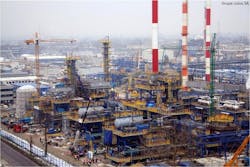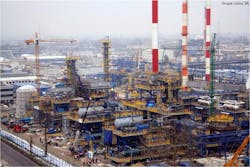Poland’s Grupa Lotos updates progress on Gdansk refinery revamp
Grupa Lotos SA, Poland’s second-largest refiner, provided an update on its plan to boost hydrogen production as part of the Polish refiner’s effective refining program (EFRA) now under way at subsidiary Lotos Asfalt’s 10.5 million-tonne/year Gdansk refinery (OGJ Online, July 15, 2015).
While the Gdansk refinery already has two hydrogen generation units (HGU), the company will build a third HGU to accommodate necessary hydrogen production required both for processing heavy oil residues into high-margin products and for fuel desulfurization in order to meet the EFRA project’s goal of increasing fuel output at the refinery by nearly 1 million tpy, Grupa Lotos said.
The new HGU will have a hydrogen generation capacity of 2.5 tonnes/hr, according to the company
Despite its ability to recover about 60% of hydrogen from refinery gases at its existing hydrogen recovery units, the Gdansk refinery currently consumes about 13.5 tonnes/hr of hydrogen, which falls short of the amount needed to boost the plant’s fuel production from hydroprocessing and other desulfurization units once EFRA is fully implemented.
The new unit is due to be commissioned and to begin raising fuel production at the refinery’s mild hydrocracking unit even before the EFRA project is completed,” said Jarosław Kawula, process engineer and project manager at Grupa Lotos.
A specific timeframe for the HGU’s startup, however, was not disclosed.
Designed to increase the refinery’s yield of high-margin middle distillates while simultaneously reducing in its output of less profitable heavy products, EFRA-related units will add about 900,000 tpy to Gdansk’s overall production of high-margin products (primarily diesel oil and aviation fuel), as well as boost refining margins at the plant by about $2/bbl.
Most recently, Grupa Lotos let a contract to KT-Kinetics Technology SPA, a subsidiary of Maire Tecnimont SPA, Milan, for engineering, procurement, and construction of a hydrowax vacuum distillation unit (HVDU) as part of EFRA, which followed its previous award of a €304-million, lump-sum turnkey EPC contract to KT for implementation of the project’s three major units, including a delayed coker unit (DCU), a coker naphtha hydrotreater (CNHT), and a KT-licensed HGU (OGJ Online, Oct. 26, 2015).
The new HVDU unit, which will be closely connected with crude processing units at the site, will process as much as 95 tonnes/hr, or more than 800,000 tpy, of untreated hydrocracking residue (hydrowax), in order to maximize the use of all byproducts and feedstock produced at each stage of crude processing, according to Grupa Lotos.
Alongside the DCU, CNHT, HGU, and HVDU, EFRA also will include installations for coke storage and loading, an oxygen generation unit, and an LPG treatment unit.
According to Grupa Lotos’ latest reports to investors, the remaining timeline for the €517 million EFRA project is as follows:
• Second-quarter 2017: Performance of EFRA-related work during Gdansk refinery’s scheduled maintenance shutdown and completion of OGU.
• Fourth-quarter 2017: Completion of HGU.
• First-quarter 2018: Completion of HVDU.
• Third-quarter 2018: Completion of tests and full commissioning of all EFRA units, including DCU.
Contact Robert Brelsford at [email protected].

